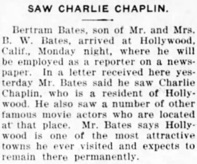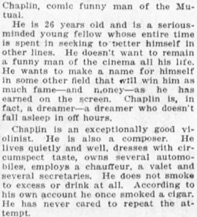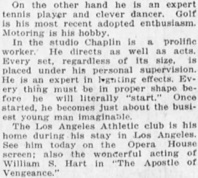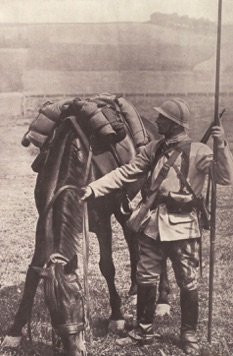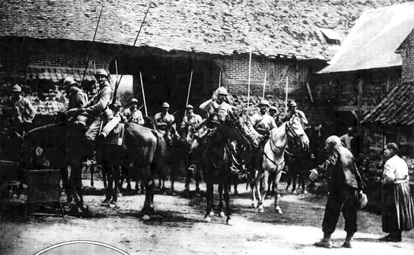The Pawnshop Clippings 1/99
Roseburg Review, Roseburg, Oregon, September 1, 1916.
The new cavalryman of France. he is prepared, with the steel
helmet, for duty in the trenches.
(...) Photo Underwood & Underwood, New York Tribune,
Sept. 24, 1916
& A French dragoon patrol entering a farmyard in Artois to water
their horses are heartily welcomed by the owner and
his wife, non the less so because the old farmer himself saw
service in a dragoon regiment in the franco-prussian
war forty-six years ago.
(...) Photo Underwood & Underwood, New York Times,
Sept. 17, 1916
& Though his publicity breaks all records, being limited only
by the habitable globe, little if anything has been
recorded of the private life of Charles Chaplin, comic funny man
of the Mutual.
He is 26 years old and is a serious-minded young fellow
whose entire time is spent in seeking to better himself
in other lines. He doesn‘t want to remain a funny man of the
cinema all his life. He wants to make a name for himself
in some other field that will win him as much fame
– and money – as he has earned on the screen. Chaplin is,
in fact, a dreamer –a dreamer who doesn‘t fall asleep
in off hours.
Chaplin is an exceptionally good violinist. He is also
a composer. he lives quietly and well, dresses
with circumspect taste, owns several automobiles, employs
a chauffeur, a valet and several secretaries. He does
not smoke to excess or drink at all. According to his own
account he once smoked a cigar. He has never
cared to repeat the attempt.
On the other hand he is an expert tennis
player and clever dancer. Golf is his most
recent adopted enthusiasm. Motoring is his hobby.
In the studio Chaplin is a prolific worker.
He directs as well as acts. Every set, regardless of its size,
is placed under his personal supervision. He is an
expert in ligthing effects. Every thing must be in proper shape
before he will literally „start.“ Once started, he becomes
just about the busiest man imaginable.
The Los Angeles Athletic club is his home during his stay
in Los Angeles.
(...) A DAY WITH CHARLES CHAPLIN ON PROGRAM
AT THE OPERA HOUSE TODAY, San Bernardino
County Sun, San Bernardino, California, Sept. 2, 1916
„He saw Charlie Chaplin“
Editorial content. „SAW CHARLIE CHAPLIN.
Bertram Bates, son of Mr. and Mrs. B. W. Bates, arrived
in Hollywood, Calif., Monday night, where he will
be employed as a reporter on a newspaper. In a letter
received here yesterday Mr. Bates said he saw
Chaplin who is a resident of Hollywood. He also saw a number
of other famous movie actors who are located at that
place. Mr. Bates says Hollywood is one of the most attractive
towns he ever visited and expects to remain there
permanently.“
Betram Bates, reporter and cartoonist for the Hollywood
Citizen, returns to Roseburg at the end of 1916.
Redaktioneller Inhalt
Alan Nevins & Henry Steele Commager, The Pocket History
of the United States, New York 1942: „In the presidential elections
of 1916 Wilson was successful, largely because he had ,kept
us out of war.‘“
He Kept Us out of War. That´s his campaign slogan.
The fighting in Europe dominates the campaign. Woodrow Wilson campaigns for re-election on a pledge of continued neutrality
in the World War One
Election night is on November 7, 1916. The electoral vote
is one of the closest in American history – with 266 votes needed
to win, Wilson takes 30 states for 277 electoral votes, while
Hughes wins 18 states and 254 electoral votes.
After the sinking of seven U.S. merchant ships by submarines
and the publication of the Zimmerman telegram, Wilson
calls for war on Germany, which the U.S. Congress declares
on April 6, 1917.
Am 28. Juli 1914 hat der Erste Weltkrieg begonnen –
„the european war“ wird er oft in amerikanischen Zeitungen
vorerst noch genannt. Am 7. November 1916 gewinnt
US-Präsident Wilson die Wiederwahl. Sein Slogan –
He kept us out of war – ist erfolgreich. Am 6. April 1917 ruft
Wilson aber zum Krieg gegen Deutschland auf.

